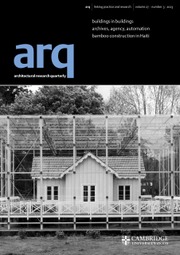No CrossRef data available.
Article contents
Houses for responsible hedonists: Troppo Architects in the North of Australia, 1980–1990
Published online by Cambridge University Press: 14 March 2014
Abstract
Troppo Architects was established in Darwin, northern Australia, in 1981. The radical ‘Troppo Style’ of their houses designed in the 1980s blur edges between indoors and outdoors, formality and informality, and enclosure and openness. In this paper a corpus of ten of those houses is examined through the lens of philosopher Warwick Fox's concept of responsive cohesion. This is a unique quality of the relations between the internal components of a ‘thing’ and also between the ‘thing’ and its contexts. The houses are exemplary in demonstrating this quality of mutual and subtle response through the interactions between their form and local environmental and cultural contexts, including the idea of responsible hedonism as a design principle.
The research utilises original documents, site visits and interviews with stakeholders, particularly the architects and the residents. The outcomes reveal interlocking links between the dwelling, the place, the values of the architects and their clients, and the global bio-physical world. They show objectives of personal enjoyment of life and environmental responsibility could co-exist in harmony. However, the research also shows how these houses change over time depending on their location and on the attitudes of their owners. They would not work elsewhere, or for clients without a similar attitude to life and the pleasures offered by everyday living close to the variety and stimuli of the outdoors.
- Type
- Design
- Information
- Copyright
- Copyright © Cambridge University Press 2013




